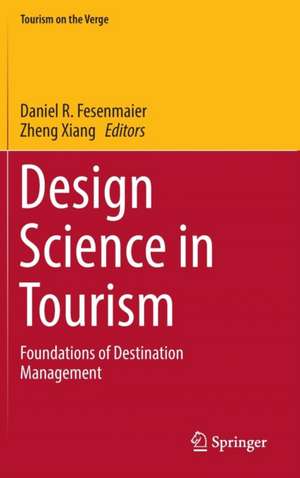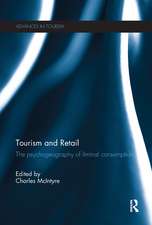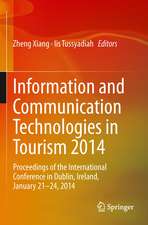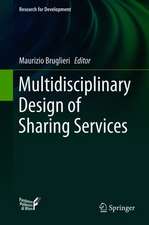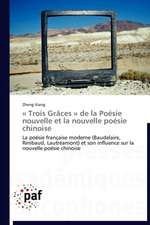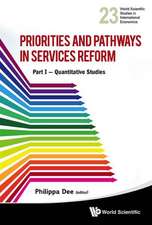Design Science in Tourism: Foundations of Destination Management: Tourism on the Verge
Editat de Daniel R. Fesenmaier, Zheng Xiangen Limba Engleză Hardback – 12 oct 2016
The book builds on recent findings in psychology, geography and urban and regional planning, as well as from economics, marketing and communications, and explores the opportunities arising from recent advances in the Internet and related technologies like memory, storage, RFID, GIS, mobile and social media in the context of collecting and analyzing traveler-related data. It presents a broad range of insights and cases on how modern design approaches can be used to develop new and better touristic experiences, and how they enable the tourism industry to track and communicate with visitors in a more meaningful way and more effectively manage visitor experiences.
| Toate formatele și edițiile | Preț | Express |
|---|---|---|
| Paperback (1) | 1379.84 lei 6-8 săpt. | |
| Springer International Publishing – 16 iun 2018 | 1379.84 lei 6-8 săpt. | |
| Hardback (1) | 1385.85 lei 6-8 săpt. | |
| Springer International Publishing – 12 oct 2016 | 1385.85 lei 6-8 săpt. |
Preț: 1385.85 lei
Preț vechi: 1690.07 lei
-18% Nou
Puncte Express: 2079
Preț estimativ în valută:
265.21€ • 287.98$ • 222.78£
265.21€ • 287.98$ • 222.78£
Carte tipărită la comandă
Livrare economică 22 aprilie-06 mai
Preluare comenzi: 021 569.72.76
Specificații
ISBN-13: 9783319427713
ISBN-10: 3319427717
Pagini: 392
Ilustrații: XIV, 272 p. 40 illus., 21 illus. in color.
Dimensiuni: 155 x 235 x 18 mm
Greutate: 0.58 kg
Ediția:1st ed. 2017
Editura: Springer International Publishing
Colecția Springer
Seria Tourism on the Verge
Locul publicării:Cham, Switzerland
ISBN-10: 3319427717
Pagini: 392
Ilustrații: XIV, 272 p. 40 illus., 21 illus. in color.
Dimensiuni: 155 x 235 x 18 mm
Greutate: 0.58 kg
Ediția:1st ed. 2017
Editura: Springer International Publishing
Colecția Springer
Seria Tourism on the Verge
Locul publicării:Cham, Switzerland
Cuprins
Part I: The Foundations of Tourism Design.- Part II: The Tools of Tourism Design.- Part III: Managing the Dynamics of the Tourism System.
Recenzii
“The book presents the outstanding works of leading tourism scholars in the field. It achieves its purpose of appreciating the progress in tourism design research over the past few decades. The book not only sets a solid basis for future tourism scholars but also enables tourism planners and practitioners to develop innovative processes and organize tourism resources. It is indeed a useful research monograph … because it offers readers various novel research ideas, updated references, and practical examples.” (Irene Cheng Chu Chan and Rob Law, Information Technology & Tourism, Vol. 17, 2017)
Notă biografică
Daniel R. Fesenmaier is Director of the Eric Friedheim Tourism Institute (EFTI), and a Professor in the Department of Tourism, Recreation and Sport Management, University of Florida. He teaches and conducts research focusing on the role of information technology in travel decisions, advertising evaluation, and the design of tourism places.
Zeng Xiang, PhD is an Associate Professor in the Department of Hospitality and Tourism Management in Pamplin College of Business at Virginia Tech. His research interests include travel information search on the Internet, social media marketing, and the impact of information technology on the tourism and hospitality industries.
Zeng Xiang, PhD is an Associate Professor in the Department of Hospitality and Tourism Management in Pamplin College of Business at Virginia Tech. His research interests include travel information search on the Internet, social media marketing, and the impact of information technology on the tourism and hospitality industries.
Textul de pe ultima copertă
This book explores the impact of design science and design thinking on tourism planning, gathering contributions from leading authorities in the field of tourism research and providing a comprehensive and interconnected panorama of cutting-edge results that influence the current and future design of tourist destinations.
The book builds on recent findings in psychology, geography and urban and regional planning, as well as from economics, marketing and communications, and explores the opportunities arising from recent advances in the Internet and related technologies like memory, storage, RFID, GIS, mobile and social media in the context of collecting and analyzing traveler-related data. It presents a broad range of insights and cases on how modern design approaches can be used to develop new and better touristic experiences, and how they enable the tourism industry to track and communicate with visitors in a more meaningful way and more effectively manage visitor experiences.
The book builds on recent findings in psychology, geography and urban and regional planning, as well as from economics, marketing and communications, and explores the opportunities arising from recent advances in the Internet and related technologies like memory, storage, RFID, GIS, mobile and social media in the context of collecting and analyzing traveler-related data. It presents a broad range of insights and cases on how modern design approaches can be used to develop new and better touristic experiences, and how they enable the tourism industry to track and communicate with visitors in a more meaningful way and more effectively manage visitor experiences.
Caracteristici
Introduces a new perspective on the foundations of tourism design and planning Reflects the impacts of the latest technological developments on tourism design and planning Provides the foundation for a new area of research and application in the field of tourism management
